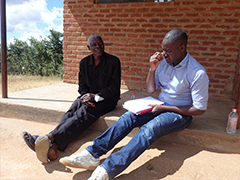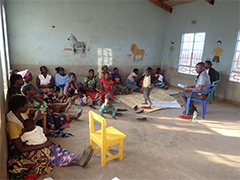- Home
- Technical Cooperation Projects
- Index of Countries
- Africa
- Malawi
- Project for Market-Oriented Smallholder Horticulture Empowerment and Promotion (MA-SHEP)
- Project News
- MA-SHEP conducted gender monitoring surveys
Project News
2022-09-12
MA-SHEP conducted gender monitoring surveys
From May to July 2022, MA-SHEP conducted two gender monitoring surveys. One is a survey in the 1st Batch and 2nd Batch target areas to confirm what changes in gender and power relations have emerged in the target farmer group members' households after the gender awareness training and how these changes have contributed to the improvement of household income, and to summarize the good practices. The second is a survey in the 4th Batch area to check whether the extension staff have conducted gender awareness training for the target farmer groups after the gender awareness ToT in December last year, whether the farmer groups understood the purpose of the training, and what changes have emerged in the target farmer groups/households after the training.
The survey for case collection was conducted in all target districts for each Batch. Ten group members were selected from each of the two farmer groups in each district to conduct individual interviews based on the questionnaire. There were 116 respondents (57 males and 49 females) in the 1st Batch target area and 90 respondents (44 males and 46 females) in the 2nd Batch target area. Results are currently being compiled, but as part of the case study, the following are the respective voices of man and woman collected in the survey.
"Since I am the head of the household, I used to control everything. I did not allow my wife to do marketing, and I used to hide the income from the sale of the produce and spend it on beer. Now that I think about it, my wife had nothing and struggled. MA-SHEP's gender awareness training was an eye opener to me. Now I work with my wife on both farming and housework, and we also discuss how to spend our income. I have also stopped spending money on beer. My neighbors laugh at me, saying that I must have been put love portion in my food, but I don't care. I don't mind, because these changes have not only improved my family's relationship with each other, but it has also increased the income so that I could buy the livestock and a sprayer for the development of the family." (a married man in his 30s)
"My husband used to tell me that he brought me here by paying bride price in full, so I couldn't say anything to him. Although my husband was not actively involved in horticultural production activities, I could not plough and ridge with oxen in his absence, and when it came time to sell the produce, he would intervene and decide how the money would be spent. I had to just keep quiet. But after MA-SHEP's gender awareness training, I was able to talk to my husband and things changed. Now I grow horticultural crops with my husband and can use oxen even when he is not around. I also became involved in marketing the crops. We now have a common vision as a family and discuss as a family how to spend money to achieve it. These changes have allowed us to increase our income and buy an ox cart, a bicycle, as well as build a house." (a married woman in her 50s)
MA-SHEP plans to conduct a similar survey in the 3rd Batch target area in September.
Another gender survey in the 4th Batch target area was conducted through focus group discussions based on a checklist with officers from the two District Agricultural Offices, four farmer groups (male and female members), and the extension staff in charge of these farmer groups. The results of the survey are not all available yet, but it was found that the extension staff had conducted gender awareness training for the target farmer groups immediately after attending the gender awareness ToT and continued follow-up activity. While it is too early to know specific changes after the training, we found that some groups and their members are already manifesting changes.
 Individual interview with a male farmer in Ntchisi
Individual interview with a male farmer in Ntchisi
 Focus group discussion with female members of Mpita group, Lilongwe West
Focus group discussion with female members of Mpita group, Lilongwe West
- About JICA
- News & Features
- Countries & Regions
- Our Work
- Thematic Issues
- Types of Assistance
- Partnerships with Other Development Partners
- Climate Change / Environmental and Social Considerations
- Evaluations
- Compliance and Anti-corruption
- Science and Technology Cooperation on Global Issues
- Research
- JICA Development Studies Program / JICA Chair
- Support for the Acceptance of Foreign HRs / Multicultural and Inclusive Community
- Publications
- Investor Relations
